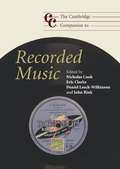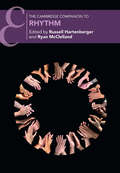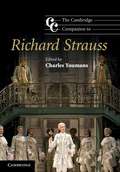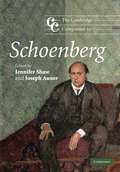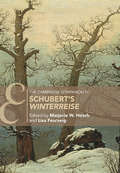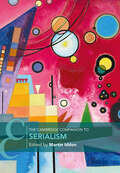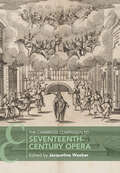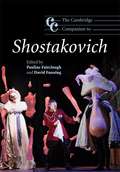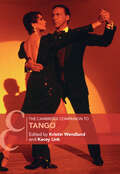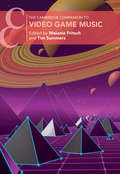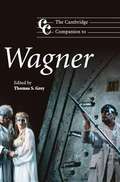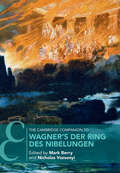- Table View
- List View
The Cambridge Companion to Percussion
by Russell HartenbergerPercussion music is both the oldest and most recent of musical genres and exists in diverse forms throughout the world. This Companion explores percussion and rhythm from the perspectives of performers, composers, conductors, instrument builders, scholars, and cognitive scientists. Topics covered include percussion in symphony orchestras from the nineteenth century to today and the development of percussion instruments in chapters on the marimba revolution, the percussion industry, drum machines, and the effect of acoustics. Chapters also investigate drum set playing and the influences of world music on Western percussion, and outline the roles of percussionists as composers, conductors, soloists, chamber musicians, and theatrical performers. Developments in scientific research are explored in chapters on the perception of sound and the evolution of musical rhythm. This book will be a valuable resource for students, percussionists, and all those who want a deeper understanding of percussion music and rhythm.
The Cambridge Companion to Pop and Rock
by Will Straw Simon Frith John StreetThis Companion maps the world of pop and rock, pinpointing the most significant moments in its history and presenting the key issues involved in understanding popular culture's most vital art form. Expert writers chart the changing patterns in the production and consumption of popular music, the emergence of a vast industry with a turnover of billions and the rise of global stars from Elvis to Public Enemy, Nirvana to the Spice Girls. They trace the way new technologies - from the amplifier to the internet - have changed the sounds and practices of pop and they analyse the way maverick entrepreneurs have given way to multimedia corporations. In particular they focus on the controversial issues concerning race and ethnicity, politics, gender and globalisation. Contains full profiles of a selection of figures from the pop and rock world.
The Cambridge Companion to Ravel
by Deborah MawerThis companion provides a comprehensive introduction to the life, music and compositional aesthetic of French composer Maurice Ravel (1875-1937). Leading international scholars offer a powerful reassessment of this most private and elusive musician, examining his work in detail within its cultural context. Marking the 125th anniversary of Ravel's birth, the volume explores the full range of his work--piano repertory, chamber works, orchestral music, ballets, songs and operas--and concludes by analyzing the performance and reception of his music, including previously untranslated reviews.
The Cambridge Companion to Recorded Music
by Nicholas Cook Eric Clarke Daniel Leech-Wilkinson John RinkFrom the cylinder to the download, the practice of music has been radically transformed by the development of recording and playback technologies. This 2009 Companion provides a detailed overview of the transformation, encompassing both classical and popular music. Topics covered include the history of recording technology and the businesses built on it; the impact of recording on performance styles; studio practices, viewed from the perspectives of performer, producer and engineer; and approaches to the study of recordings. The main chapters are interspersed by 'short takes' - short contributions by different practitioners, ranging from classical or pop producers and performers to record collectors. Combining basic information with a variety of perspectives on records and recordings, this book will appeal not only to students in a range of subjects from music to the media, but also to general readers interested in a fundamental yet insufficiently understood dimension of musical culture.
The Cambridge Companion to Rhythm (Cambridge Companions to Music)
by Russell Hartenberger Ryan McClellandOne of the defining aspects of music is that it exists in time. From clapping to dancing, toe-tapping to head-nodding, the responses of musicians and listeners alike capture the immediacy and significance of the musical beat. This Companion explores the richness of musical time through a variety of perspectives, surveying influential writings on the topic, incorporating the perspectives of listeners, analysts, composers, and performers, and considering the subject across a range of genres and cultures. It includes chapters on music perception, visualizing rhythmic notation, composers' writings on rhythm, rhythm in jazz, rock, and hip-hop. Taking a global approach, chapters also explore rhythmic styles in the music of India, Africa, Bali, Latin America and the Caribbean, and Indigenous music of North and South America. Readers will gain an understanding of musicians' approaches to performing complex rhythms of contemporary music, and revealing insights into the likely future of rhythm in music.
The Cambridge Companion to Richard Strauss
by Charles YoumansRichard Strauss is a composer much loved among audiences throughout the world, both in the opera house and the concert hall. Despite this popularity, Strauss was for many years ignored by scholars, who considered his commercial success and his continued reliance on the tonal system to be liabilities. However, the past two decades have seen a resurgence of scholarly interest in the composer. This Companion surveys the results, focusing on the principal genres, the social and historical context, and topics perennially controversial over the last century. Chapters cover Strauss's immense operatic output, the electrifying modernism of his tone poems, and his ever-popular Lieder. Controversial topics are explored, including Strauss's relationship to the Third Reich and the sexual dimension of his works. Reintroducing the composer and his music in light of recent research, the volume shows Strauss's artistic personality to be richer and much more complicated than has been previously acknowledged.
The Cambridge Companion to Rossini
by Emanuele SeniciThis 2004 Companion is a collection of specially commissioned essays on one of the most influential opera composers in the repertoire. The volume is divided into four parts, each exploring an important element of Rossini's life, his world, and his works: biography and reception; words and music; representative operas; and performance. Within these sections accessible chapters, written by a team of specialists, examine Rossini's life and career; the reception of his music in the nineteenth century and today; the librettos and their authors; the dramaturgy of the operas; and Rossini's non-operatic works. Additional chapters centre on key individual operas chosen for their historical importance or position in the present repertoire, and include Tancredi, Il barbiere di Siviglia, Semiramide, and Guillaume Tell. The last section, Performance, focuses on the history of Rossini's operas from the viewpoint of singing and staging, as well as the influence of editorial work on contemporary performance practice.
The Cambridge Companion to Schoenberg
by Jennifer Shaw Joseph AunerArnold Schoenberg - composer, theorist, teacher, painter, and one of the most important and controversial figures in twentieth-century music. This Companion presents engaging essays by leading scholars on Schoenberg's central works, writings, and ideas over his long life in Vienna, Berlin, and Los Angeles. Challenging monolithic views of the composer as an isolated elitist, the volume demonstrates that what has kept Schoenberg and his music interesting and provocative was his profound engagement with the musical traditions he inherited and transformed, with the broad range of musical and artistic developments during his lifetime he critiqued and incorporated, and with the fundamental cultural, social, and political disruptions through which he lived. The book provides introductions to Schoenberg's most important works, and to his groundbreaking innovations including his twelve-tone compositions. Chapters also examine Schoenberg's lasting influence on other composers and writers over the last century.
The Cambridge Companion to Schubert's ‘Winterreise' (Cambridge Companions to Music)
by Lisa Feurzeig Marjorie W. HirschOrganized in five parts, this Companion enhances understanding of Schubert's Winterreise by approaching it from multiple angles. Part I examines the political, cultural, and musical environments in which Winterreise was created. Part II focuses on the poet Wilhelm Müller, his 24-poem cycle Die Winterreise, and changes Schubert made to it in fashioning his musical setting. Part III illuminates Winterreise by exploring its relation to contemporaneous understandings of psychology and science, and early nineteenth-century social and political conditions. Part IV focuses more directly on the song cycle, exploring the listener's identification with the cycle's protagonist, text-music relations in individual songs, Schubert's compositional 'fingerprints', aspects of continuity and discontinuity among the songs, and the cycle's relation to German Romanticism. Part V concentrates on Winterreise in the nearly two centuries since its completion in 1827, including lyrical and dramatic performance traditions, the cycle's influence on later composers, and its numerous artistic reworkings.
The Cambridge Companion to Schumann
by Beate PerreyThis Companion is an accessible introduction to Schumann: his time, his temperament, his style and his œuvre. An international team of scholars explores the cultural context, musical and poetic fabric, sources of inspiration and interpretative reach of key works from the Schumann repertoire ranging from his famous lieder and piano pieces to chamber, orchestral and dramatic works. Additional chapters address Schumann's presence in nineteenth- and twentieth-century composition and the fascinating reception history of his late works. Tables, illustrations, a detailed chronology and advice on further reading make it an ideally informative handbook for both the Schumann connoisseur and the music lover. An excellent textbook for the university student of courses on key composers of nineteenth-century Western Classical music, it is an invaluable guide for all who are interested in the thought, aesthetics and affective power of one of the most intriguing figures of a culturally rich and formative period.
The Cambridge Companion to Serialism (Cambridge Companions to Music)
by Martin IddonWhat is serialism? Defended by enthusiastic champions and decried by horrified detractors, serialism was central to twentieth-century art music, but riven, too, by inherent contradictions. The term can be a synonym for dodecaphony, Arnold Schoenberg's 'method of composing with twelve tones which are related only to one another'. It can be more expansive, describing ways of composing systematically with parameters beyond pitch - duration, dynamic, and more - and can even stand as a sort of antonym to dodecaphony: 'Schoenberg is Dead', as Pierre Boulez once insisted. Stretched to its limits, it can describe approaches where sound can be divided into discrete parameters and later recombined to generate the new, the unexpected, beginning to blur into a further antonym, post-serialism. This Companion introduces and embraces serialism in all its dimensions and contradictions, from Schoenberg and Stravinsky to Stockhausen and Babbitt, and explores its variants and legacies in Europe, the Americas and Asia.
The Cambridge Companion to Seventeenth-Century Opera (Cambridge Companions to Music)
by Jacqueline WaeberThe Cambridge Companion to Seventeenth-Century Opera is a much-needed introduction to one of the most defining areas of Western music history - the birth of opera and its developments during the first century of its existence. From opera's Italian foundations to its growth through Europe and the Americas, the volume charts the changing landscape – on stage and beyond – which shaped the way opera was produced and received. With a range from opera's sixteenth-century antecedents to the threshold of the eighteenth century, this path breaking book is broad enough to function as a comprehensive introduction, yet sufficiently detailed to offer valuable insights into most of early opera's many facets; it guides the reader towards authoritative written and musical sources appropriate for further study. It will be of interest to a wide audience, including undergraduate and graduate students in universities and equivalent institutions, and amateur and professional musicians.
The Cambridge Companion to Shostakovich
by Pauline Fairclough David FanningAs the Soviet Union's foremost composer, Shostakovich's status in the West has always been problematic. Regarded by some as a collaborator, and by others as a symbol of moral resistance, both he and his music met with approval and condemnation in equal measure. The demise of the Communist state has, if anything, been accompanied by a bolstering of his reputation, but critical engagement with his multi-faceted achievements has been patchy. This Companion offers a new starting point and a guide for readers who seek a fuller understanding of Shostakovich's place in the history of music. Bringing together an international team of scholars, the book brings up-to-date research to bear on the full range of Shostakovich's musical output, addressing scholars, students and all those interested in this complex, iconic figure.
The Cambridge Companion to Sibelius
by Daniel M. GrimleyJean Sibelius has gradually emerged as one of the most striking and influential figures in twentieth-century music, yet his work is only just beginning to receive the critical attention that its importance deserves. This Companion provides an accessible and vivid account of Sibelius's work in its historical and cultural context. Leading international scholars, from Finland, the United States and the UK, examine Sibelius's music from a range of critical perspectives, including nationalism, eroticism and the exotic, music and landscape, reception and musical influence. There are also chapters on recording and interpretation that offer fascinating insights into the performance of Sibelius's work. The book includes much material, drawing on scholarship, as well as providing a comprehensive introduction to Sibelius's major musical achievements.
The Cambridge Companion to Singing
by John PotterThis is the only book to cover in detail so many aspects of the voice, ranging from medieval music to Madonna and beyond. Almost anything one wants to know about singing practices and singing styles can be found here in chapters that cover world music, rock, rap and jazz; European art song, ensemble singing, the English cathedral tradition and the choral movement in the United States; Renaissance, Baroque and Classical singing treatises, contemporary vocal techniques, children's choirs and the teaching of singing today. The contributors are leading international performers and specialists.
The Cambridge Companion to Stravinsky
by Jonathan CrossContains a wide range of essays reflecting the breadth of Stravinsky's musical achievement.
The Cambridge Companion to Tango (Cambridge Companions to Music)
by Kacey Link Kristin WendlandTango music rapidly became a global phenomenon as early as the beginning of the twentieth century, with about 30% of gramophone records made between 1903 and 1910 devoted to it. Its popularity declined between the 1950s and the 1980s but has since risen to new heights. This Companion offers twenty chapters from varying perspectives around music, dance, poetry, and interdisciplinary studies, including numerous visual and audio illustrations in print and on the accompanying webpages. Its multidisciplinary approach demonstrates how different disciplines intersect through performative, historical, ethnographic, sociological, political, and anthropological perspectives. These thematic continuities illuminate diverse international perspectives and highlight how the art form flourished in Argentina, Uruguay and abroad, while tracing its international and cultural impact over the last century. This book is an innovative resource for scholars and students of tango music, particularly those seeking a diverse international perspective on the subject.
The Cambridge Companion to The Singer-Songwriter
by Katherine Williams Justin A. Williams Williams, Katherine and Williams, Justin A.Most often associated with modern artists such as Bob Dylan, Elton John, Don McLean, Neil Diamond, and Carole King, the singer-songwriter tradition in fact has a long and complex history dating back to the medieval troubadour and earlier. This Companion explains the historical contexts, musical analyses, and theoretical frameworks of the singer-songwriter tradition. Divided into five parts, the book explores the tradition in the context of issues including authenticity, gender, queer studies, musical analysis, and performance. The contributors reveal how the tradition has been expressed around the world and throughout its history to the present day. Essential reading for enthusiasts, practitioners, students, and scholars, this book features case studies of a wide range of both well and lesser-known singer-songwriters, from Thomas d'Urfey through to Carole King and Kanye West.
The Cambridge Companion to The Symphony
by Julian HortonFew genres of the last 250 years have proved so crucial to the course of music history, or so vital to public musical experience, as the symphony. This Companion offers an accessible guide to the historical, analytical and interpretative issues surrounding this major genre of Western music, discussing an extensive variety of works from the eighteenth century to the present day. The book complements a detailed review of the symphony's history with focused analytical essays from leading scholars on the symphonic music of both mainstream composers, including Haydn, Mozart and Beethoven and lesser-known figures, including Carter, Berio and Maxwell Davies. With chapters on a comprehensive range of topics, from the symphony's origins to the politics of its reception in the twentieth century, this is an invaluable resource for anyone with an interest in the history, analysis and performance of the symphonic repertoire.
The Cambridge Companion to Twentieth-Century Opera
by Mervyn CookeThis Companion celebrates the extraordinary riches of the twentieth-century operatic repertoire in a collection of specially commissioned essays written by a distinguished team of academics, critics and practitioners. Beginning with a discussion of the century's vital inheritance from late-romantic operatic traditions in Germany and Italy, the text embraces fresh investigations into various aspects of the genre in the modern age, with a comprehensive coverage of the work of individual composers from Debussy and Schoenberg to John Adams and Harrison Birtwistle. Traditional stylistic categorizations (including symbolism, expressionism, neo-classicism and minimalism) are reassessed from new critical perspectives, and the distinctive operatic traditions of Continental and Eastern Europe, Russia and the Soviet Union, the United Kingdom and United States are subjected to fresh scrutiny. The volume includes essays devoted to avant-garde music theatre, operettas and musicals, filmed opera, and ends with a discussion of the position of the genre in today's cultural marketplace.
The Cambridge Companion to Vaughan Williams
by Alain Frogley Aidan J. ThomsonAn icon of British national identity and one of the most widely performed twentieth-century composers, Ralph Vaughan Williams has been misunderstood as much as he had been revered; his international impact and enduring influence on areas as diverse as church music, film scores and popular music has been insufficiently appreciated. This volume brings together a team of leading scholars, examining all areas of the composer's output from new perspectives, and re-evaluating the cultural politics of his lifelong advocacy for the music-making of ordinary people. Surveys of major genres are complemented by chapters exploring such topics as the composer's relationship with the BBC and his studies with Ravel; uniquely, the book also includes specially commissioned interviews with major living composers Peter Maxwell Davies, Piers Hellawell, Nicola Lefanu and Anthony Payne. The Companion is a vital resource for all those interested in this pivotal figure of modern music.
The Cambridge Companion to Verdi
by Scott L. BalthazarThis 2004 Companion provides a biographical, theatrical and social-cultural background for Verdi's music, examines in detail important general aspects of its style and method of composing, and synthesizes stylistic themes in discussions of representative works. Aspects of Verdi's milieu, style, creative process and critical reception are explored in essays by highly reputed specialists. Individual chapters address themes in Verdi's life, his role in transforming the theater business, and his relationship to Italian Romanticism and the Risorgimento. Chapters on four operas representative of the different stages of Verdi's career, Ernani, Rigoletto, Don Carlos and Otello synthesize analytical themes introduced in the more general chapters and illustrate the richness of Verdi's creativity. The Companion also includes chapters on Verdi's non-operatic songs and other music, his creative process, and scholarly writing about Verdi from the nineteenth-century to the present day.
The Cambridge Companion to Video Game Music (Cambridge Companions to Music)
by Tim Summers Melanie FritschVideo game music has been permeating popular culture for over forty years. Now, reaching billions of listeners, game music encompasses a diverse spectrum of musical materials and practices. This book provides a comprehensive, up-to-date survey of video game music by a diverse group of scholars and industry professionals. The chapters and summaries consolidate existing knowledge and present tools for readers to engage with the music in new ways. Many popular games are analysed, including Super Mario Galaxy, Bastion, The Last of Us, Kentucky Route Zero and the Katamari, Gran Turismo and Tales series. Topics include chiptunes, compositional processes, localization, history and game music concerts. The book also engages with other disciplines such as psychology, music analysis, business strategy and critical theory, and will prove an equally valuable resource for readers active in the industry, composers or designers, and music students and scholars.
The Cambridge Companion to Wagner
by Thomas S. GreyRichard Wagner is remembered as one of the most influential figures in music and theatre, but his place in history has been marked by a considerable amount of controversy. His attitudes towards the Jews and the appropriation of his operas by the Nazis, for example, have helped to construct a historical persona that sits uncomfortably with modern sensibilities. Yet Wagner's absolutely central position in the operatic canon continues. This volume serves as a timely reminder of his ongoing musical, cultural, and political impact. Contributions by specialists from such varied fields as musical history, German literature and cultural studies, opera production, and political science consider a range of topics, from trends and problems in the history of stage production to the representations of gender and sexuality. With the inclusion of invaluable and reliably up-to-date biographical data, this collection will be of great interest to scholars, students, and enthusiasts.
The Cambridge Companion to Wagner's Der Ring des Nibelungen (Cambridge Companions to Music)
by Nicholas Vazsonyi Mark BerryThe Companion is an essential, interdisciplinary tool for those both familiar and unfamiliar with Wagner's Ring. It opens with a concise introduction to both the composer and the Ring, introducing Wagner as a cultural figure, and giving a comprehensive overview of the work. Subsequent chapters, written by leading Wagner experts, focus on musical topics such as 'leitmotif', and structure, and provide a comprehensive set of character portraits, including leading players like Wotan, Brünnhilde, and Siegfried. Further chapters look to the mythological background of the work and the idea of the Bayreuth Festival, as well as critical reception of the Ring, its relationship to Nazism, and its impact on literature and popular culture, in turn offering new approaches to interpretation including gender, race and environmentalism. The volume ends with a history of notable stage productions from the world premiere in 1876 to the most recent stagings in Bayreuth and elsewhere.

